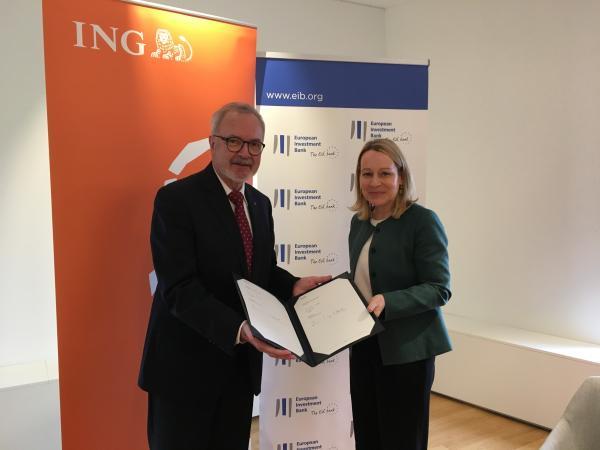
The European Investment Bank (EIB) and ING today signed an agreement to support green investments for the European shipping market for a total value of EUR 300m. ING and EIB will each contribute EUR 150m to the facility. This agreement will ensure that sponsors of green and sustainable projects in the maritime transport sector can benefit from advantageous financial terms.
The facility is available to clients with significant European interests, and can be used for projects with a green innovation element covering the construction of new vessels or retrofitting of existing vessels. It applies to both inland shipping and seagoing operators.
This agreement forms part of ING’s wider sustainability strategy, which aims to facilitate and finance society’s shift to sustainability – environmental, economic, and social. To this end, we are helping to develop and promote sustainable business models and explore how sustainable financing can help support energy transition and combat climate change.
In order to create a diversified portfolio, the EUR 300m facility will be invested with the EIB gradually over the next three years, with ING’s shipping team leading and managing the commitment. The deal also benefits from the guarantee of the European Fund for Strategic Investments (EFSI), the central element of the Juncker Plan.
“I think it’s no secret that the shipping sector is a major contributor to CO2 emissions. Climate action is one of the EIB’s top priorities, and this type of financing should be seen as an incentive for ship owners to consider doing things differently. ” said EIB President Werner Hoyer. “The facility was set up after numerous discussions with Dutch counterparts from the public and private sector and aims to help the shipping sector transition to a greener future. ”
Isabel Fernandez, Head of Wholesale Banking at ING, added: “Sustainability is an important strategic priority for ING and we are very proud to partner with the EIB to encourage our shipping clients to think about more green and sustainable financing options. This agreement helps us support our shipping clients into making changes to their business models by adapting for the future in increasingly sustainable way, and supports them throughout their green journey.”
This sector risk-bearing facility is meant for projects that will improve the environmental performance of transport vessels in terms of reducing the emission of pollutants as well as increasing fuel efficiency. Projects should be presented to ING and will be subject to ING’s financial and non-financial risk acceptance criteria.
Background information:
The European Investment Bank (ElB) is the long-term lending institution of the European Union owned by its Member States. It makes long-term finance available for sound investment in order to contribute towards EU policy goals. Last year the EIB provided some EUR 2.18bn for projects in the Netherlands.
ING is a global financial institution with a strong European base, offering banking services through its operating company ING Bank. The purpose of ING Bank is empowering people to stay a step ahead in life and in business. ING Bank’s more than 51,000 employees offer retail and wholesale banking services to customers in over 40 countries. ING Group shares are listed on the exchanges of Amsterdam (INGA NA, INGA.AS), Brussels and on the New York Stock Exchange (ADRs: ING US, ING.N). Sustainability forms an integral part of ING’s strategy, evidenced by ING’s ranking as a leader in the banks industry group by Sustainalytics. ING Group shares are included in the FTSE4Good index and in the Dow Jones Sustainability Index (Europe and World), where ING is also among the leaders in the banks industry group.
Today's investment is made under the Green Shipping Guarantee (GSG) Programme, which is supported by the EU's Connecting Europe Facility (CEF) Debt Instrument and the European Fund for Strategic investments (EFSI). The Programme is designed both for general fleet renewal and the retrofitting of ships with sustainable technologies (such as LNG, ballast water, energy efficiency, etc.). The GSG programme is a follow-up to the work of the European Sustainable Shipping Forum (ESSF) – an expert group bringing together Member States, maritime industries' stakeholders and the Commission.



